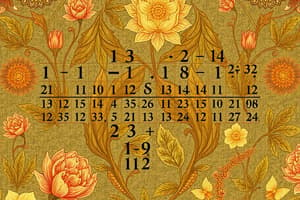Podcast
Questions and Answers
What does fractional calculus study?
What does fractional calculus study?
- The classical calculus operations
- Differentiation and integration of complex functions
- Applications of linear operators in mathematical analysis
- Different possibilities of defining real and complex number powers of the differentiation and integration operators (correct)
In the context of fractional calculus, what does the term 'powers' refer to?
In the context of fractional calculus, what does the term 'powers' refer to?
- Exponential functions
- Complex number operations
- Integration of functions
- Iterative application of a linear operator to a function (correct)
What does the expression $D^{1/2}$ represent in fractional calculus?
What does the expression $D^{1/2}$ represent in fractional calculus?
- An iterative application of the integration operator
- A classical differentiation operation
- A complex number operation
- An analogue of the functional square root for the differentiation operator (correct)
How can the definition of $\frac{d^{n}y}{dx^{n}}$ be extended to all real values of $n$?
How can the definition of $\frac{d^{n}y}{dx^{n}}$ be extended to all real values of $n$?
For what type of function is $f(x)$ defined in the given context?
For what type of function is $f(x)$ defined in the given context?
Define the concept of fractional calculus and its main focus.
Define the concept of fractional calculus and its main focus.
Explain the iterative application of a linear operator D to a function f.
Explain the iterative application of a linear operator D to a function f.
What is the significance of defining a linear operator for every real number a in the context of fractional calculus?
What is the significance of defining a linear operator for every real number a in the context of fractional calculus?
In the context of fractional calculus, how can the term 'powers' be interpreted?
In the context of fractional calculus, how can the term 'powers' be interpreted?
Under what conditions does there exist an operator P such that D^n = P?
Under what conditions does there exist an operator P such that D^n = P?
Flashcards are hidden until you start studying
Study Notes
Fractional Calculus
- Fractional calculus is a branch of mathematics that studies the extension of differential calculus to non-integer powers.
Powers in Fractional Calculus
- In fractional calculus, 'powers' refer to non-integer exponents or orders of differentiation.
Notation in Fractional Calculus
- The expression $D^{1/2}$ represents a half-order derivative operator in fractional calculus.
Extension of Classical Derivative
- The definition of $\frac{d^{n}y}{dx^{n}}$ can be extended to all real values of $n$ in fractional calculus.
Function Types in Fractional Calculus
- The function $f(x)$ is typically defined for functions of the real variable $x$ in the context of fractional calculus.
Definition and Focus of Fractional Calculus
- Fractional calculus is a mathematical approach that generalizes classical calculus to handle non-integer orders of differentiation and integration, focusing on the study of fractional derivatives and integrals.
Iterative Application of Linear Operators
- The iterative application of a linear operator $D$ to a function $f$ involves repeatedly applying the operator to the result of the previous application.
Significance of Defining Linear Operators
- Defining a linear operator for every real number $a$ is significant in fractional calculus as it enables the generalization of classical calculus to non-integer orders.
Interpretation of 'Powers' in Fractional Calculus
- In fractional calculus, the term 'powers' can be interpreted as non-integer orders of differentiation or integration.
Conditions for Operator Existence
- There exists an operator $P$ such that $D^n = P$ under specific conditions, which enables the definition of fractional derivatives and integrals.
Studying That Suits You
Use AI to generate personalized quizzes and flashcards to suit your learning preferences.




